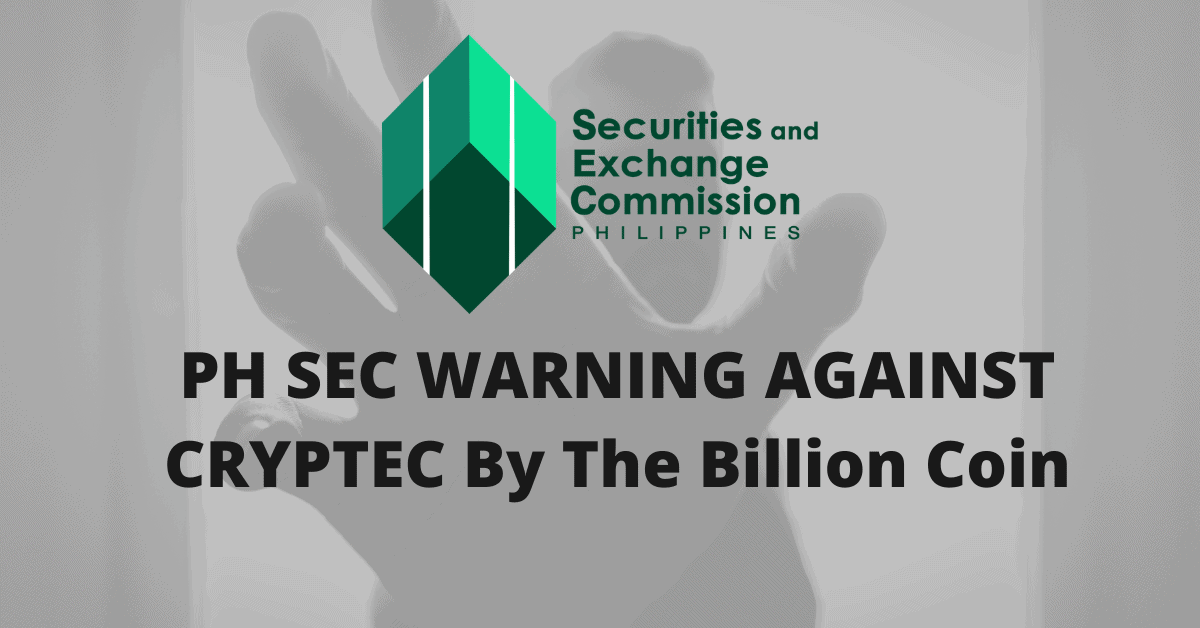PH SEC Advisory on The Billion Coin (TBC) Scam
SEC: Based on numerous online postings, TBC claims that TBCoin’s value will never drop and only continues to increase by 1 – 5% daily until it reaches 1 billion Euros per 1 TBCoin (1 TBC).

April 15, 2020 – The Philippines Securities and Exchange Commission (SEC) advises the public against The Billion Coin (TBC) by Kris Kringle. TBC is engaged in enticing the public to invest in a “cryptocurrency” called TBCoin and this investment-taking activity is not authorized by the Commission.
The Billion Coin Scam Crypto
In a press release, the SEC said TBC claims TBCoin is a “true and decentralized” cryptocurrency that “will eradicate world poverty”.
The SEC made a difference between Bitcoin and other cryptocurrencies vs TBCoin. While Bitcoin follows market-driven norms, the TBCoin value or price is based on the number of its users. Simply put it claims that its price increases as long as the number of its users and holders increases. TBC calls TBCoin an “abundance-based cryptocurrency.”
How TBC Gets Its Value
Based on numerous online postings, TBC claims that TBCoin’s value will never drop and only continues to increase by 1 – 5% daily until it reaches 1 billion Euros per 1 TBCoin (1 TBC).
The Billion Coin has its own way of assigning value to the TBCoin: Total number of TBC investors multiplied by 1 Euro. Simply put, if there are 1 billion investors, 1 TBC will equal to 1 billion Euros.
TBC Investment Packages
TBC is also offering investment packages ranging from Php 100 – Php 25,000 with a return of 100% every 25 days with additional bonuses and leverages as a wat to entice more investors and encourage these investors to invite more members.
TBC also uses well-known personalities in their marketing materials to lead the public to believe that these personalities are approving the scheme.
SEC Advisory
SEC concludes TBC is offering the sale of securities in the form of investment contracts to the public. Such undertaking requires a secondary license from the Commission, which TBC by Kris Kringle does not have. Additionally, TBC and its operator Kris Kringle is also not registered as a partnership or corporation with the SEC.
On the subject of whether TBCoin shall be treated as a cryptocurrency, the SEC said their advisory on Initial Coin Offerings and Virtual Currency in 2018 clearly specified that some virtual currencies, based on facts and circumstances surrounding their issuance, follow the nature of “securities” and thus must have the approval of the SEC first for such tokens to be issued or sold to the public.
Not on Any Reputable List
The Billion Coin also does not appear in the list of licensed virtual currency exchanges by the Bangko Sentral ng Pilipinas (BSP). In the Philippines, the BSP requires the virtual currency license to companies that will engage in the selling of crypto to fiat and vice versa.
SEC additionally said TBCoin or The Billion Coin does not appear in the list of generally accepted virtual currencies like on the CoinmarketCap list and World Coin Index list. This, despite TBC’s assertion that they are on par with the leading cryptocurrencies in the market.
SEC also said it appears no open exchanges allow the trading of TBCoins or TBC and it appears to only have its own digital exchange. The Commission noted how TBC investors are using social media websites to sell their TBCoins for a lesser amount due to lack of trading options. Others organize online merchant stores that accept TBC as a mode of payment.
The Commission warns the public to not invest or stop investing in any scheme offered by The Billion Coin and its operator Kris Kringle and asserts that any promise of ridiculous returns with little to no risk is an indication of a Ponzi Scheme. A Ponzi scheme is when money from new investors is used to pay fake profits to earlier investors.
Violations and Warning
The Commission warned that such entities violate the Securities Regulation Code (for offering unregistered securities), the Revised Corporation Code, and the recently passed Bayanihan to Heal as One Act for doing cyber incidents that make use of the current health crisis situation to prey on the public through scams, phishing, fraudulent emails, or other similar acts, subject to fines amounting to a maximum of Php 5 million or 21 years of imprisonment (SRC).
SEC said the names of those involved will be reported to the Bureau of Internal Revenue (BIR).
Read the SEC Advisory here.
This article is published on BitPinas: PH SEC Advisory on The Billion Coin (TBC) Scam





![[Exclusive] Conquest Event Recap: Coins.ph CEO Reveals NFT, P2E Game Center Plans 7 [Exclusive] Conquest Event Recap: Coins.ph CEO Reveals NFT, P2E Game Center Plans](https://bitpinas.com/wp-content/uploads/2022/07/coinsph-wei-zhou-interview-768x402.png)

